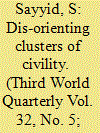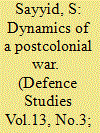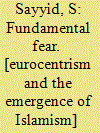| Srl | Item |
| 1 |
ID:
106660


|
|
|
|
|
| Publication |
2011.
|
| Summary/Abstract |
Into what kind of narrative can we fit the recent eruption of the so-called `Arab street' into the public square? It is easy to argue that the reason why we are not certain what the story of the `Arab spring' is, is because it is too early to tell, and there is a degree of merit in this position; however, this simply defers rather than addresses the question. The problem with the recent popular mobilisations that swept many parts of Muslimistan is not purely empirical but rather conceptual. To tell a story presumes a language. Language is not itself a transparent medium, it does not just describe a pre-existing reality, it is also constitutive: it organises concepts, establishes relationships and networks, associations and dis-associations. The language that we use to apprehend the world around us is the residue of struggles of previous times; our vocabularies are crystallisations of specific historical confrontations and settlements. If our discourse (that is, both linguistic and extra-linguistic signifying practices) comes about as result of sedimented remains of historical struggles, then how can our discourse apprehend a world in which those historical forces are no longer in play?
|
|
|
|
|
|
|
|
|
|
|
|
|
|
|
|
| 2 |
ID:
126385


|
|
|
|
|
| Publication |
2013.
|
| Summary/Abstract |
The 'war on terror' has become the grammar of contemporary international relations. Analysis of the 'war on terror' has become overdetermined by broader discussion about the utility of organized violence following the end of the Cold War. This focus has led to a perception that the link between war and politics has been fundamentally weakened, if not entirely severed. This article argues that the 'de-politicization' of war thesis gets in the way of a more fruitful understanding of the relationship between international order and the occurrence and conduct of warfare. Paradoxically, policy that may stem from an analysis that depoliticizes armed conflict makes it more difficult to imagine the possibility of peace. Colonial-type wars are one instance of armed conflict which is asymmetrically depoliticized. The attempt to fit the 'war on terror' into a colonial war-shaped hole is unsustainable. Colonial warfare cannot provide solutions to postcolonial military challenges. This article argues for an understanding of the 'war on terror' as postcolonial war in which the political is very much present.
|
|
|
|
|
|
|
|
|
|
|
|
|
|
|
|
| 3 |
ID:
049977


|
|
|
|
|
| Publication |
London, Zed Books, 2003.
|
| Description |
xxiii, 185p.
|
| Standard Number |
9781842771976
|
|
|
|
|
|
|
|
|
|
|
|
Copies: C:1/I:0,R:0,Q:0
Circulation
| Accession# | Call# | Current Location | Status | Policy | Location |
| 047390 | 297.09/SAY 047390 | Main | On Shelf | General | |
|
|
|
|
| 4 |
ID:
079714


|
|
|
|
|
| Publication |
2007.
|
| Summary/Abstract |
This article attempts to place Islamism within the context of the current
world order. The first of its two parts looks at the way in which many of the
popular conceptions of Islamism circulate in popular, journalistic and
public policy narratives. Within this context, the paper criticises these narratives
for providing a misleading and deeply flawed perception of Islamism
and what it actually represents as a religion and a political philosophy. The
second part of the paper examines the extent to which the emergence of a
new discourse in the West, which is referred to as Eurocentrism, has
impacted on our understanding of Islamism and obstructed our ability to
achieve a more perceptive vista of Islamism in terms of what it stands for
and what it is trying to achieve
|
|
|
|
|
|
|
|
|
|
|
|
|
|
|
|
| 5 |
ID:
081800


|
|
|
|
|
| Publication |
London, Hurst and Company, 2006.
|
| Description |
xi, 436p.Pbk
|
| Standard Number |
9781850657972
|
|
|
|
|
|
|
|
|
|
|
|
Copies: C:1/I:0,R:0,Q:0
Circulation
| Accession# | Call# | Current Location | Status | Policy | Location |
| 053480 | 941.004914/ALI 053480 | Main | On Shelf | General | |
|
|
|
|